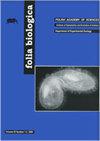疏水藻酸盐衍生物和四氢利普他汀对添加棕榈脂和胆固醇的大鼠代谢的影响。
IF 0.8
4区 生物学
Q4 BIOLOGY
引用次数: 1
摘要
研究了褐藻酸十八烯酰胺和四氢lipstatin对大鼠血清和肝脏胆固醇以及粪便脂肪和甾醇排泄量的影响。酰胺海藻酸盐是脂类的吸附剂,四氢利普他汀是胰脂肪酶的抑制剂。大鼠分别饲喂含有10 g/kg胆固醇和70 g/kg棕榈脂的饲料。棕榈脂由椰子粉提供。饲粮中添加40 g/kg的海藻酸酰胺可显著降低血清总胆固醇、低密度脂蛋白和肝脏胆固醇以及肝脏脂质,增加粪便中脂肪和coprostanol的排泄量。300 mg/kg饲粮中添加四氢lipstatin可显著降低低密度脂蛋白胆固醇和肝脏脂质,增加粪便脂肪排出量。对采食量影响不显著;然而,喂食修饰海藻酸盐的大鼠体重增加低于对照组大鼠。改性海藻酸盐和四氢利普他汀都改变了排泄物脂质的脂肪酸谱。饱和脂肪酸浓度降低,不饱和脂肪酸浓度升高。尽管作用方式不同,但改性海藻酸盐和四氢lipstatin在去除体内膳食脂肪方面同样有效。本文章由计算机程序翻译,如有差异,请以英文原文为准。
Metabolic Effects of a Hydrophobic Alginate Derivative and Tetrahydrolipstatin in Rats Fed a Diet Supplemented with Palm Fat and Cholesterol.
The effects of octadecylamide of alginic acid (amidated alginate) and tetrahydrolipstatin on serum and hepatic cholesterol, and the faecal output of fat and sterols, were investigated in rats. Amidated alginate is a sorbent of lipids, tetrahydrolipstatin is an inhibitor of pancreatic lipase. Rats were fed diets containing cholesterol and palm fat at 10 and 70 g/kg, respectively. Palm fat was provided by coconut meal. Amidated alginate at 40 g/kg diet significantly decreased serum total cholesterol, low-density lipoprotein and hepatic cholesterol, and hepatic lipids and increased the faecal output of fat and coprostanol. Tetrahydrolipstatin at 300 mg/kg diet significantly decreased low-density lipoprotein cholesterol and hepatic lipids and increased the faecal output of fat. The intake of feed was not significantly influenced; however, the weight gains in rats fed amidated alginate were lower than in rats of the control group. Both amidated alginate and tetrahydrolipstatin modified the fatty acid profile in excreta lipids. Concentrations of saturated fatty acids were decreased and those of unsaturated fatty acids increased. Despite different modes of action, amidated alginate and tetrahydrolipstatin were equally efficient in removing the dietary fat from the body.
求助全文
通过发布文献求助,成功后即可免费获取论文全文。
去求助
来源期刊

Folia Biologica-Krakow
医学-生物学
CiteScore
1.10
自引率
14.30%
发文量
15
审稿时长
>12 weeks
期刊介绍:
Folia Biologica (Kraków) is an international online open access journal accepting original scientific articles on various aspects of zoology: phylogeny, genetics, chromosomal studies, ecology, biogeography, experimental zoology and ultrastructural studies. The language of publication is English, articles are assembled in four issues per year.
 求助内容:
求助内容: 应助结果提醒方式:
应助结果提醒方式:


